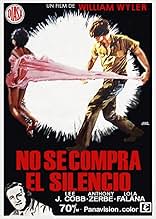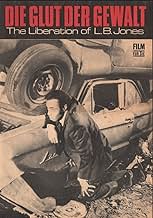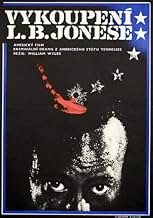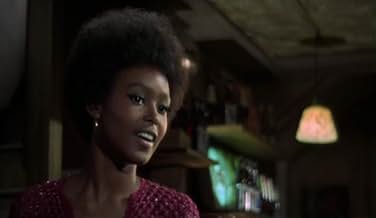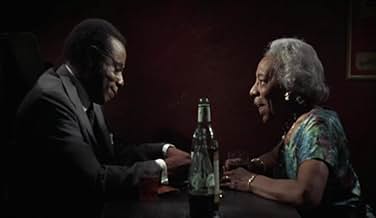IMDb RATING
6.8/10
1.3K
YOUR RATING
A successful African American businessman has a quarrel with a white policeman, suspecting that he is having an affair with his wife. The policeman's colleagues are seeking to avoid publicit... Read allA successful African American businessman has a quarrel with a white policeman, suspecting that he is having an affair with his wife. The policeman's colleagues are seeking to avoid publicity.A successful African American businessman has a quarrel with a white policeman, suspecting that he is having an affair with his wife. The policeman's colleagues are seeking to avoid publicity.
- Awards
- 1 nomination total
Joseph Attles
- Henry
- (as Joe Attles)
Featured reviews
Sometimes I have to scratch my head and wonder why the hell a film isn't more acclaimed and/or remembered. William Wyler's last film The Liberation of L.B. Jones (1970) is one of these. A nail biting inferno of racial hate and discomfort.
Don't read the tagline and stay away from certain posters, it might spoil it! But even though I knew part of the outcome parts of this film stopped me from breathing, and I'm still filled with this heavy indescribable feeling.
It's essentially the tale of when the people discriminated against stops being afraid. It's also an exploration of the small towns of a bygone age, and their despicable sentiments.
The Liberation of L.B. Jones would fit perfectly in the company of films in In the Heat of the Night. Perhaps it was just a tad late, or perhaps it was a bit too bleak, but this is surely a film I will remember. A wonderful way to go out for the legendary Mr. Wyler. One of the best directors who ever lived! 8.5/10
Don't read the tagline and stay away from certain posters, it might spoil it! But even though I knew part of the outcome parts of this film stopped me from breathing, and I'm still filled with this heavy indescribable feeling.
It's essentially the tale of when the people discriminated against stops being afraid. It's also an exploration of the small towns of a bygone age, and their despicable sentiments.
The Liberation of L.B. Jones would fit perfectly in the company of films in In the Heat of the Night. Perhaps it was just a tad late, or perhaps it was a bit too bleak, but this is surely a film I will remember. A wonderful way to go out for the legendary Mr. Wyler. One of the best directors who ever lived! 8.5/10
This is a sad film about personal weaknesses. The storyline has several weak points too, but on the whole I should think the movie does a great director like William Wyler justice and is still watchable today. There is a certain similarity with the Oscar winning In the Heat of the Night. The screenplay is by the same author, Stirling Silliphant.
The Liberation of L. B. Jones really belongs to the African American cast, the whites' performances do pale in comparison. Roscoe Lee Browne plays the well-to-do undertaker who is cheated by his wife with a white policeman. He gives his character a quiet dignity that lasts throughout the story, up to the bitter and sad end. Yaphet Kotto's portrayal of an angry young man who comes to town with a score to settle is equally intense and convincing. Both Browne and Kotto have a few very good scenes in which they act by themselves. They both seize the chance to give their characters real depth. Lola Falana is convincing as the amoral undertaker's wife and there is a good supporting cast. I fondly remember a small, well acted scene at the beginning with an elderly lady who regularly visits the undertaker's show room to have a look at the coffin for which she pays instalments.
The white population is, it seems to me, much more stereotypical. The only really interesting figure here is the town's most important lawyer, played somewhat stiffly by Lee J. Cobb. He is a racist against his better judgment. His unlawful actions to protect white criminals seem like a reflex, not coming from the brain but rather from the spinal cord.
The Liberation of L. B. Jones really belongs to the African American cast, the whites' performances do pale in comparison. Roscoe Lee Browne plays the well-to-do undertaker who is cheated by his wife with a white policeman. He gives his character a quiet dignity that lasts throughout the story, up to the bitter and sad end. Yaphet Kotto's portrayal of an angry young man who comes to town with a score to settle is equally intense and convincing. Both Browne and Kotto have a few very good scenes in which they act by themselves. They both seize the chance to give their characters real depth. Lola Falana is convincing as the amoral undertaker's wife and there is a good supporting cast. I fondly remember a small, well acted scene at the beginning with an elderly lady who regularly visits the undertaker's show room to have a look at the coffin for which she pays instalments.
The white population is, it seems to me, much more stereotypical. The only really interesting figure here is the town's most important lawyer, played somewhat stiffly by Lee J. Cobb. He is a racist against his better judgment. His unlawful actions to protect white criminals seem like a reflex, not coming from the brain but rather from the spinal cord.
It is appropriate that the title character is an undertaker for this final film from William Wyler feels like a mass funeral for all hopes of racial reconciliation in the America of 1970, (not that it's gotten any easier now). The last shot of the two white liberals and the lone black radical sitting on opposite sides of the train as it flees the benighted region of bigotry and violence says it all. You certainly do not expect that these thee will come together once the train passes from Kentucky to Ohio! A powerful, somber image to end a powerful, somber film. Somber but not dull. Sure the proceedings can get lurid at times, even semi trashy. But I prefer this to the heavy handed, messagey treatment Hollywood has often employed when dealing with black/white conflict. (See the ouevre of Stanley Kramer and his students). Indeed, had the screenplay, by Stirling Silliphant (revisiting racial bleakness after "In The Heat Of The Night") and Jesse Hill Ford (the novelist upon whose work the film is based and himself a tragic figure), been better, with a fuller examination of the white liberals' characters and their relationship with the white patrician lawyer, wonderfully played by Lee J Cobb, then this film would have approached greatness, in my opinion. As it is let us give it a B for a solid end to one of Hollywood's most distinguished directorial runs, as well as the performances of Cobb, Anthony Zerbe and Arch Johnson, playing two of the more despicable redneck cops you'll ever see, a young and intense Yaphet Kotto and, above all, Roscoe Lee Browne as defiant, unbending LB Jones. Haven't seen enough of this fine actor's work to say whether it's his best but it has to rank fairly high, one would think.
PS...I regularly excoriate TCM on its programming choices (like devoting an entire day to the work of Arlene Dahl or repeatedly showing "Wait Until Dark" and "Alice In Movieland") but I have to congratulate whoever came up with last month's spotlight on final films from great directors. A total blast. At the very least, (as in "Ambush"), interesting and at best, (as in "Madadayo"), eye opening.
PS...I regularly excoriate TCM on its programming choices (like devoting an entire day to the work of Arlene Dahl or repeatedly showing "Wait Until Dark" and "Alice In Movieland") but I have to congratulate whoever came up with last month's spotlight on final films from great directors. A total blast. At the very least, (as in "Ambush"), interesting and at best, (as in "Madadayo"), eye opening.
In small town Tennessee, Sonny Boy Mosby (Yaphet Kotto) jumps off the train with a pistol. Rich businessman L. B. Jones (Roscoe Lee Browne) is desperate to divorce his wife Emma who is having an affair with white police officer Willie Joe Worth. Emma intends to hold L. B. to ransom before giving him a divorce. Officer Worth wants him to drop the matter entirely. Lawyers Oman Hedgepath (Lee J. Cobb) and his nephew Steve Mundine (Lee Majors) also advise him to let it go. Officers Worth and Bumpas like to brutalize the black community.
This definitely has a feel of "In the Heat of the Night" except the story is messier and less iconic. A bit of simplification would make this more compelling. I know it's based on a book, but most of time, long books need to be chopped down in order to fit into a movie. It also pales in comparison with others of its genre.
This definitely has a feel of "In the Heat of the Night" except the story is messier and less iconic. A bit of simplification would make this more compelling. I know it's based on a book, but most of time, long books need to be chopped down in order to fit into a movie. It also pales in comparison with others of its genre.
The Liberation of L. B. Jones (1970) is currently available on Tubi. The storyline involves a black couple going through a divorce when the man discovers his wife is cheating on him with a local white police officer. When the woman hires a lawyer and threatens to fight the divorce, the police officer is informed the nature of their relationship may become public. Since white and black people sleeping together is heavily frowned upon the police officer could lose his job. He quickly goes on a rampage beating his lover and trying to hide the nature of their relationship by any means necessary. This movie is directed by William Wyler (Ben-Hur) and stars Lee J. Cobb (12 Angry Men), Lola Falana (The Klansman), Lee Majors (The Six Million Dollar Man), Roscoe Lee Browne (Logan's Run) and Yaphet Kotto (Alien). The storyline for this is very well told and portrayed. The ex-husband's patience was absolutely unbelievable, but so was his wife's ruthlesness. This movie in some ways gave me divorce PTSD. I loved the character interactions across the board and the set-up by the ruthless and dirty police officers was good, which makes the ending even more enjoyable. Overall this is a smart movie with a well told storyline I would strongly recommend seeing. I'd score this a solid 7.5/10.
Did you know
- TriviaFinal film of director William Wyler.
- Quotes
Emma Jones: It going be something. I can't let nobody rob my baby and I can't let my baby enter this world without a dime!
- ConnectionsFeatured in Classified X (2007)
Details
- Release date
- Country of origin
- Language
- Also known as
- The Liberation of L.B. Jones
- Filming locations
- Humboldt, Tennessee, USA(location shooting - used for Somerton, Tenn.)
- Production company
- See more company credits at IMDbPro
Box office
- Budget
- $3,500,000 (estimated)
Contribute to this page
Suggest an edit or add missing content

